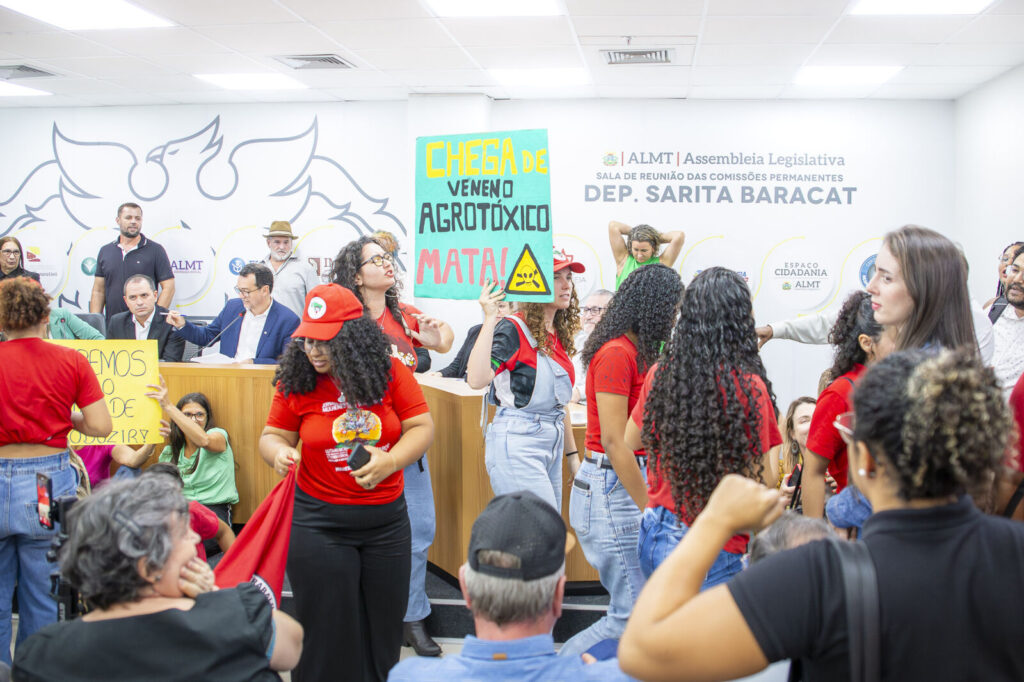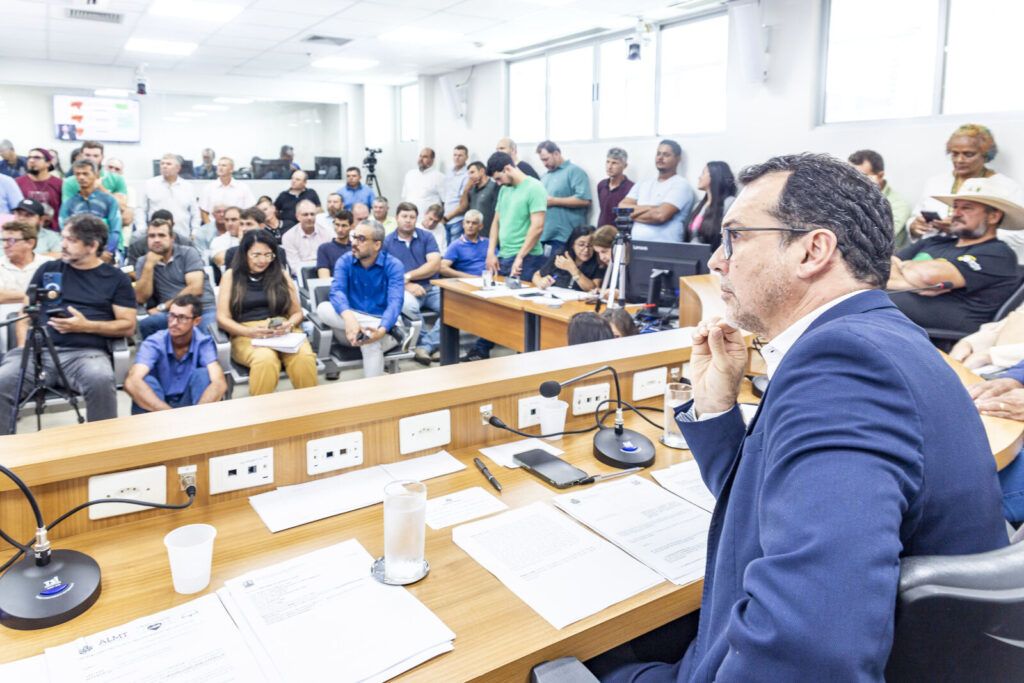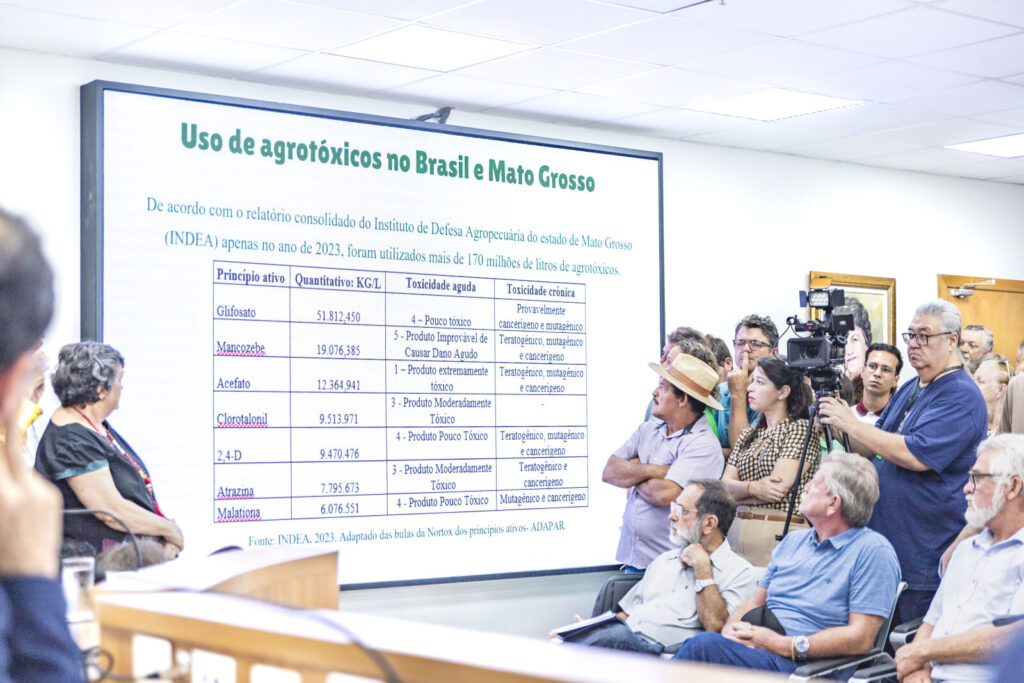The PL from the chemical: in a disaster, announced in Mato Grosso
Bill 1833/23 provides for the termination of the threshold for the application of agro-chemicals on a small property in the state
AI generated audio
By: Bruna Pinheiro
One the one hand, pick up trucks, 4×4, buckles and chains of gold. On the other hand, scientific studies, and the flags of the fight. Apparently, the discussion about the LG 1833/2023 – one that tries to reduce the limit to 300 meters for the application of agro-chemicals for up to scratch (some properties), it may be, between the proponents of the agribusiness sector, and workers in the field. But it’s not. The science comes in on the debate, and it is the warning of the risk to all of you. This is an increase of cases of contamination, chemical, diagnostic, cancer, and malformation of the fetus, food poisoning, and diseases, such as Alzheimer’s disease.

“Agribusiness is a lie, Brazil” chanted the young people living in the Movement of Rural landless Workers (MST (M), which is the same to a lesser degree, they have made all the difference in a public hearing in the Legislative Assembly (ALMT) to discuss the issue on Tuesday (the 18th). And once again, the science is ignored by the president of the state of Mato Grosso, which is trying at all costs to approve the bill with Poison. The design, created by the state of Gilberto Cattani (PL), have been approved in the first poll, in September 2024, and in accordance with the schedule of the ALMT, it should be put to a second vote on Wednesday (the 19th). In the course of the month, three of the substitute have been presented, discussed, and rejected by the parliament. However, the text still exists, and is considering reducing the threshold for the application of agro-chemicals.
Convened by the deputy of the state Lúdio Cabral (PORTUGAL), is one of the few parliamentarians to speak contrary to the proposal to a public hearing that lasted more than four hours. Scientists and researchers from the institutions of the state and the feds introduced the studies and surveys regarding the impact of pesticides on the environment and the population at large. To advocate for the development of a medical doctor, with his research without scientific journal), commissioned by the Brazilian Association of Producers of Soybeans (Aprosoja), one of the giants of agribusiness in the state.

A professor in the center for the Study of Environmental and occupational Health (Neast-UFMT), Marcia Montanari is a researcher on the subject for more than 15 years and has warned of the risks of chemical exposure is through the consumption of food, and proximity to the sites of a spray-and-up with the use of contaminated clothing, as there is research to prove the residues of chemical pesticides in the cotton, in the state of Mato Grosso. The Neast-UFMT, is one of the organizations-members of the Forum, a Popular social and Environmental-of-state of Mato Grosso (From), in addition to composing the collective and the national campaign against the misuse of pesticides.
“State of Mato Grosso is the highest use of pesticides in Brazil, and a number of studies have confirmed the injury to the health of the people because of this. The shorter the distance between the places of the application, the greater the risk of getting sick. It is a major public health problem, and to reduce this limit, it will expose you to people, and in particular in the interior of the state. It’s safe to say that this is a disease that is chronic, and the diseases that arise in the course of time”.

The Oswaldo Cruz Foundation (Fiocruz), a researcher and assistant to the Prosecutor of the Work (MPT), Karen Frederick, pointed out that the impact of the chemicals they are not restricted to those who eat or work in the vicinity of farms and other rural properties. According to her, in 81% of their products are allowed into Brazil is prohibited by the countries of the OECD (organization of the world in 38 different countries of importance in the international market, and by 50% in the european union. For each 10 gallons of toxic chemicals, which was nearly seven to cause cancer, and damage to sensitive skin from being in the glyphosate and 2,4-D are some of the most popular in the state of Mato Grosso.
“Each of us will have the least knowledge about the health impacts and measures for the protection of individuals environmentally exposed to pesticides. As a result, you will be the only of the workers, or the one who feeds off of these products. Unfortunately, they all live in a state where the minimum clearance may be reduced will be exposed to the disease.
The responsibility of members of parliament, about the rise of the poison on the table of families, craftworkers, and the environment has been reported by a researcher at the University of São Paulo (USP) and Universidade Federal do Amazonas (UFAM), Luke Ferrante, calling it a “fallacy” of the arguments at the oral hearing that the reduction of the threshold for the application that product will not cause harm to the environment and to your health. Another point that was brought by the researcher, it was about the damage of pesticides on biodiversity, which protects the crop, the mortality rate of the species are endemic to the changes, and even extinction. According to him, the products are not in control of all the pests of the crop, it being the responsibility of the species in their own wild fauna and flora, which will be in charge of it.
“The reduction to 25 feet hurt, the protection of communities and the environment, increases in the incidence of contamination, and it is very well documented. To the members, if they approve the project, which will take responsibility for damage to the environment, agriculture, and public health. There is a responsibility on the release of contamination, the mass of this poison”.
In a survey carried out by the Neast/UFMT), in partnership with Operation in the Amazon’s Native (OPAN), the impact on the indigenous people by the use of chemical pesticides on crops that are close to their territory, has been identified by carbofurano, which is prohibited in Brazil in the fall of 2017, and more than 50 years ago in Europe and in the states in the us. It can lead to a risk of death after the ingestion or inhalation of, a lot of damage to the systems, neurological, respiratory, and endocrine abnormalities of the fetus in humans, animals, wild, and great persistence in the environment.
It was also found atrazine, a herbicide, to the group of chemical triazine ring, which has the function of drying, which is prohibited in the European Union since 2004), and carbendazim, a fungicide is highly toxic, it was trading down in Brazil in the year 2022, after the process of re-evaluation.
The project leverages other irregularities
In the legal field, also took part in the hearing, the public prosecutor of the Y-TM, Bruno Choairy, he mentioned the cases of violation of fundamental rights, and labor, and the example is an investigation of the farm that is the most bought pesticides in the state of Mato Grosso, and of the irregularity, he had a lodging for the workers and 45 yards on the farm, when exposure to the chemicals.
The attorney-general of the MINISTRY-MT, Gabriel, Prince, listed are still the priorities that should be included in the debate on the question of agricultural chemicals, in addition to the distance, such as the use of the product for the eviction of the squatters on the property, rural, weak oversight, ad campaigns, on the use of pesticides and the implementation of regulations that will increase the protection of people and the environment. MPF-MT is already against the bill 1833/23 by the harmful effects of pesticides.
“Clear the film for the application of pesticides, the origin of the population of the agriculture of the living. It becomes more and more clear contradiction in the state of Mato Grosso. The agricultural production is not giving up, because of the greed of the mechanisms that protect the environment and human health, which brings reflections to the outside. International organizations are concerned with the quality of what is being produced here. This is a note from the negative to the economy of the state is based on agriculture,” he said to the deputy of the state Lúdio Cabral (PT).
In November, 2024, the Human Rights Watch (hrw), an international organization of human rights, with about 400 members are spread across several countries, has released a special material on the LG 1.833/2023. Text warning of the threat posed by the project to the health and livelihood in the state.
The regular session of the ALMT that you can get your project on the second ballot, beginning at 9 a.m., this Wednesday (19th). If you are approved, the bill goes to the sanction or veto by the governor, Mauro Mendes.To watch the hearing in its entirety, and to see all of the testimonials by clicking HERE.
